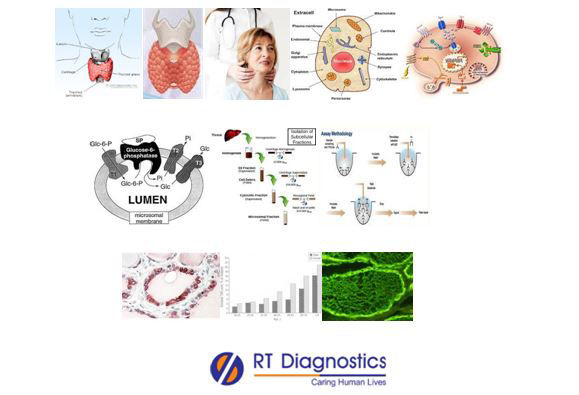Thyroperoxidase Antibody - TPO:
Why Thyroperoxidase Antibody Test?
CLINICAL INFORMATION
The thyroid gland is a small butterfly-shaped endocrine gland present in the front of the neck (below the voice box). The thyroid gland secretes thyroid hormones into the blood which helps to reach target tissues. Thyroid hormones (T3 and T4) play a key role in many body functions like BMR, digestion, fertility, growth, heart rate etc. The thyroid gland helps regulate metabolism through the synthesis of thyroid hormones. It regulates metabolism through the production of thyroid hormones T3 and T4. Clinical manifestations of an under-active thyroid include – digestive problems including constipation, problems in menstruation (in women), tiredness and lack of energy, dry hair and skin, swelling around the eyes, frequent feeling of being cold, weight gain, depression, forgetfulness, and joint pains etc. Signs and symptoms of an overactive thyroid include – feeling weak and tired, trembling of hands and fingers, weight loss, anxiety, nervousness, irritability, sweating heavy, fast and irregular heartbeat, low tolerance for heat etc. Thyroperoxidase is also called thyroid peroxidase - TPO (or iodine peroxidase). Thyroperoxidase is a membrane-bound heme-containing glycoprotein located in the apical membrane of the thyrocyte. In humans, the enzyme thyroperoxidase is encoded by TPO gene. The expression of the TPO gene is triggered by TSH, while TPO is inhibited by thioamide drugs such as propylthiouracil, methimazole etc. Thyroperoxidase is an enzyme mainly expressed in the thyroid that is secreted into the colloid. The enzyme thyroperoxidase helps in the iodination of tyrosine residues on thyroglobulin for the synthesis of thyroid hormones namely - T3 (triiodothyronine) and T4 (thyroxin). The enzyme thyroperoxidase is identified frequently as an epitope in most of the auto-immune disorders related to thyroid and also in certain breast cancers. A few examples include anti-thyroid peroxidase antibodies (TPOAb), auto-antibody or immune-mediated Hashimoto’s thyroiditis etc. Therefore antibody titer is used to assess the disease activity in patients developed with such autoantibodies in thyroid disorders. Other associated disorders include Graves’ disease. Hence thyroperoxidase (TPO) test is useful in screening for diagnosis of anti-thyroperoxidase antibodies, Hashimoto’s thyroiditis, Graves’ disease, nontoxic nodular goitre, granulomatous thyroiditis, primary myxedema, cancers of the thyroid, pregnant woman with an auto-immune disease that involve thyroid (increases the risk of hypothyroidism or hyperthyroidism in fetuses and newborns), patients with goitre, abnormal thyroid test results, type 1 diabetes (juvenile diabetes), autoimmune hemolytic anaemia, autoimmune hepatitis, autoimmune adrenal diseases, autoimmune collagen vascular diseases etc. Moreover, this test is also a helpful screening test in a differential diagnosis to differentiate chronic lymphocytic thyroiditis from Hashimoto’s thyroiditis. Certain other auto-immune disorders that may cause positive anti-thyroid peroxidase antibodies (TPOAb) include Sjogren’s syndrome, lupus (SLE), rheumatoid arthritis, pernicious anaemia etc. Additional tests include anti-microsomal antibody test, complement fixation test, immuno-fluorescence of tissue biopsy, passive hemagglutination, Micro-Titer Particle Agglutination test (MCHA), high sensitive assays such as RIA, ELISA etc. Other tests include the evaluation of thyroid hormones T3, T4, TSH, TRH, thyroglobulin etc.

General Instructions:
Sample Requirement: Specimen - Blood sample collected from the vein. Test Preparation: None.
NOTE - Sample for specimen collections may vary based on the patient’s condition/cases according to the patient’s presenting complaints/signs or symptoms:
SPECIMEN REQUIREMENT (Special or Rare Cases) - As instructed and guided by Physician / Clinician / Pathologist / as per Laboratory’s requirements, according to procedures and protocols.
This Multi-Specialty Clinical Referral Laboratory RT DIAGNOSTICS provides precise and accurate tests with an extensive range of testing services to the medical centres to help in the diagnosis and identification of pathology in the test specimens for infectious diseases and also to evaluate the function of organ systems of the patient. It prevents further complications and helps to stabilize and restore health to near normalcy at the earliest without delay.



